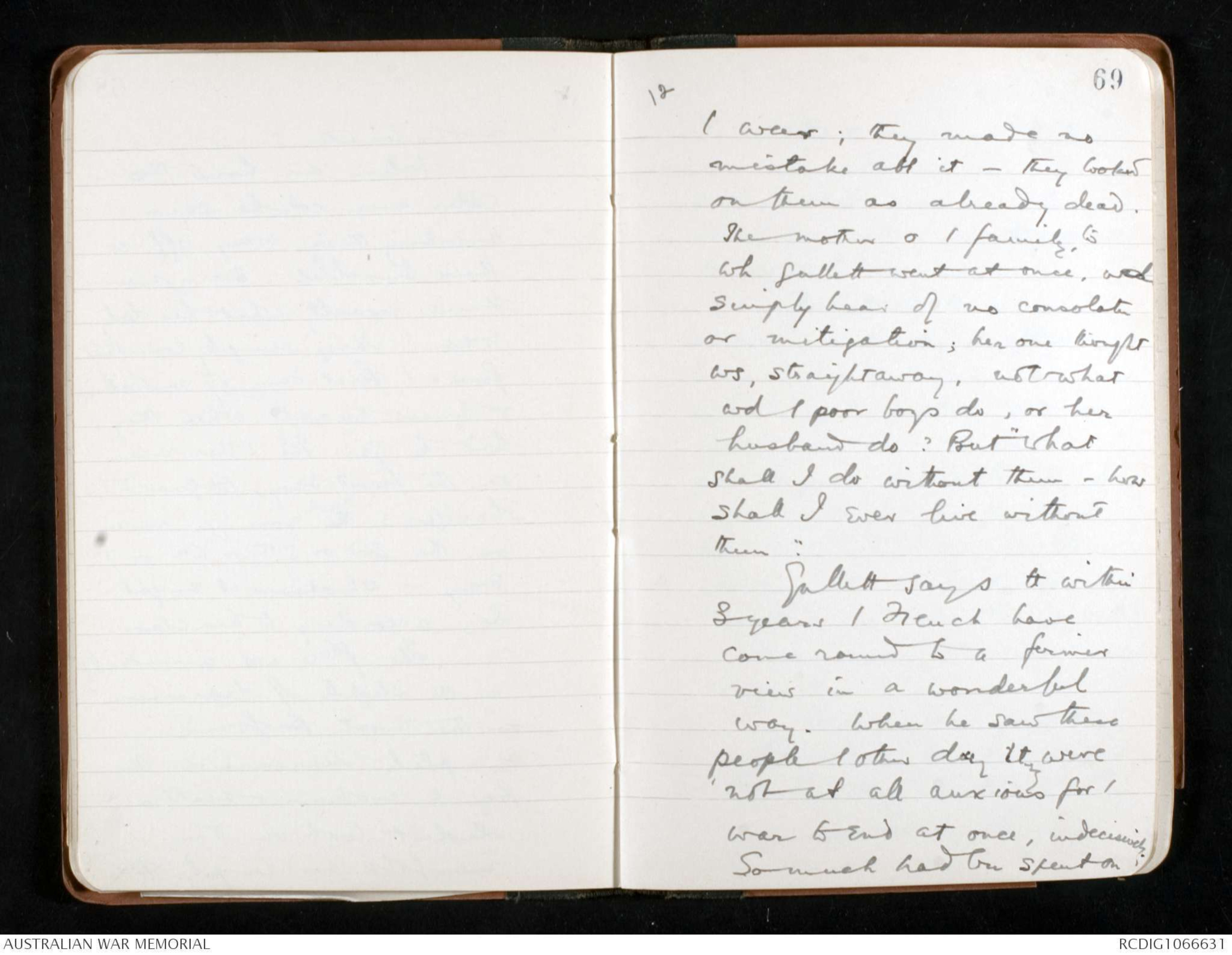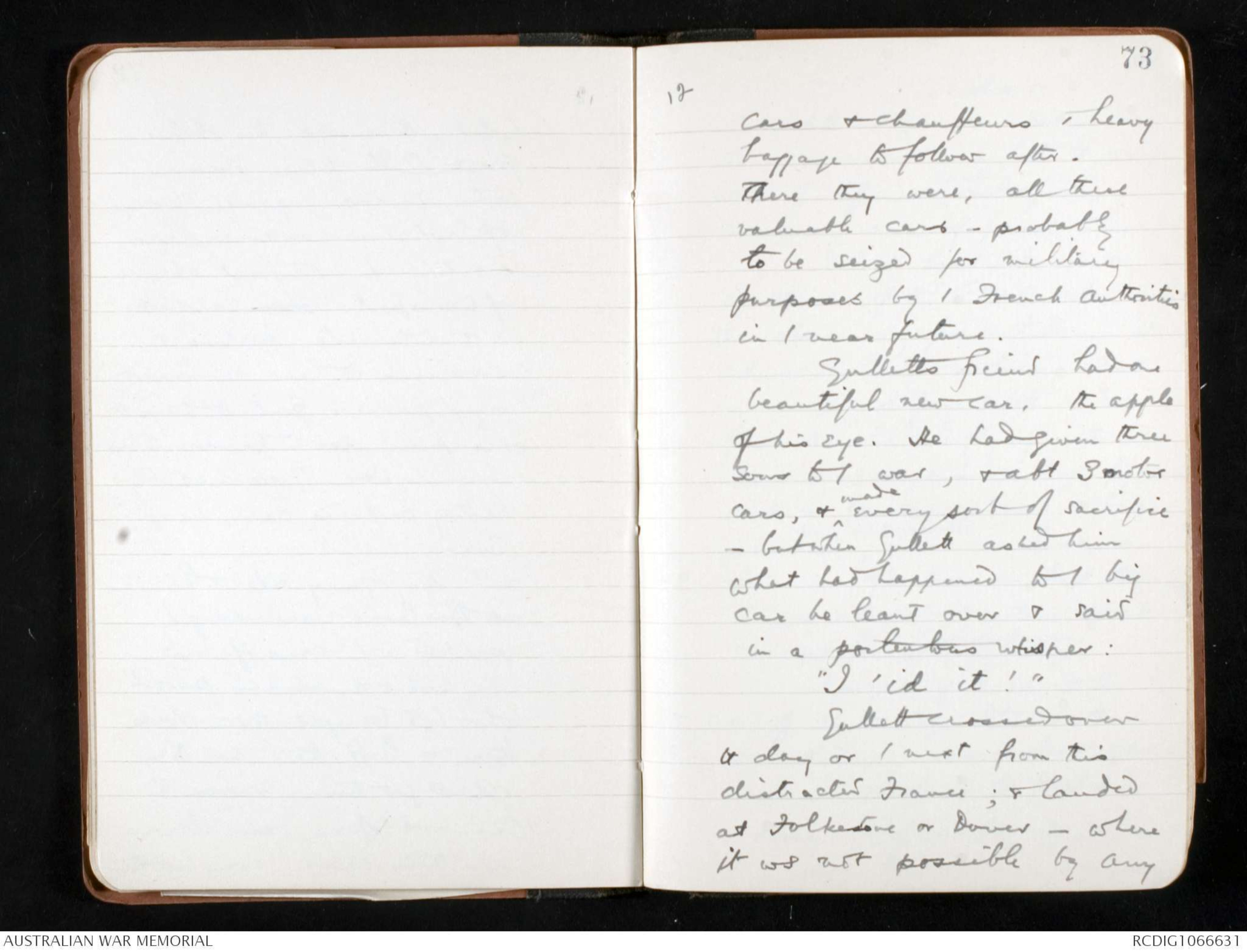Charles E W Bean, Diaries, AWM38 3DRL 606/132/1 - August - September 1917 - Part 6










12
65
a proportion who apparently
cannot face it.
Aug 29. was to have
left for England today to
fix up with Smart the turning
over of the Trophy section
to Treloar at the A.W.R.S
We were to look in at the
review of the divns by Haig
on the way - but the car
broke a spring in Renescure
& so ws I had to give up the
idea of crossing today.
It ws this day tt /
review by Haig took place
wh I have wrongly put
down as having occurred
on Aug 28.27. Plumer reviewed
the 1st Divn yesty (28th) & Murdoch
arrd just in time to see that review.
Haig received 2nd & 5th Divns
on 29th. [This is written on Sept 15
while I wait for Gullett & Dyson at the Rly crossing in St Pol]
12
66
Gullett & I were going on to
meet Leist & Power - the
artists - in Boulogne. However
the weather is so heavy tt they
cdnt cross.
Aug 30. With Gullett to
Boulogne. I have poisoned
my right foot & am very
lame. The artists are
not to arrive until
Sep 3 - A.M.L.O. ^Boulogne had a telegram
to that effect from 1st Anzac.
I crossed to Folkestone
in / evening. Gullett ws possibly
going to stay with some friends
- wealthy French people - w
whom he stayed when / war
broke out in 1914. In
Aug 1914, he sd, he & Mrs
Gullett were taking a holiday
at a Wimereux hotel. They were
12
67
sitting on / beach one of those
mornings; w a big crowd
of holidaymakers bathing
& paddling - men women &
children. Suddenly they
looked up & saw the whole
crowd streaming off /
beach towards / town.
Within a quarter of an hour
there ws not a soul to
be seen on / beach - the
sand ws deserted. The
mobilisatn order had
come. Every French man
& woman knew what it
meant. They were crowding
round the actual notices
in the town with the usual
anxiety to see it although
they knew its tenour well
enough. It ws simply:
"Today is the first day of
12
68
mobilisatn."
Within an hour the
elder men cd be seen
making their way off w
their bundles. Everyman
knew exactly what his duty
was. They simply counted
from / first day of mobilisatin
& knew exactly when they
had to go: The elder men
on the first day, to guard /
bridges; the each younger man
on the 3rd or 5th or 6th or 7th
day - whichever it might
be, according to his class.
The place ws immediately
in the depth of depression
- the most profound
complete depression. The
french mothers & sisters
didn't look on their
menfolk as simply off to
12
69
/ war; they made no
mistake abt it - they looked
on them as already dead.
The mother o / family, to
wh Gullett went at once, wd
simply hear of no consolatn
or mitigation; her one thought
ws, straightaway, not what
wd / the poor boys do, or her
husband do? But "what
shall I do without them - how
shall I ever live without
them."
Gullett says tt within
3 years / French have
come round to a firmer
view in a wonderful
way. When he saw these
people / other day they were
not at all anxious for /
war to end at once, indecisively.
So much had bn spent on
12
70
it in life & misery tt they
were almost anxious for it
to go another year in order to
reach an ending worthy of all
tt expenditure.
Gullett sd tt when he
& Mrs Gullett sayw the flight crowd
leave / beach / question arose
what they themselves shd do -
leave at once, or wait a
few days. He settled it: There
is no need for frantic haste.
The hotel is not going to close
down in an instant. We will
wait & see how things settle
& cross over when the rush
is past.
They went back to /
Hotel & saw the "Patron" &
told him they wanted to stay
tomorrow & a few days
longer perhaps - they supposed
12
71
he wd not want them to be
going.
"I do not know what
you may do, M'sieu", ws
what he sd. "All I know
is tt this hotel closes
tomorrow! You may stay
tonight if you will - your
beds will be there! But
I do not guarantee you
dinner, I do not guarantee
breakfast; I guarantee
nothing. The serv All I know
is tt / servants are
mobilise's, I am
mobilise', everyone is
mobilise'."That day Gullett went
off to his friends & borrowed
this big car to take his
luggage. When he got back to /
12
72
hotel, there ws the whole
front of the place stacked
with visitors luggage, luggage
of Englishmen & Americans
waiting for the first chance
of transport. They Cars were
not to be had, porters &
carriers cd have commanded
any price. Gullett says tt
his friend could have made
hundreds of pounds by
letting out his car, he is
sure.
The quay side & terminus
at Boulogne were simply
packed w / cars of rich
English & American people
who had brought them down
there & left them as they
cd not get them across the
Channel. Some came down
in their cars, some left their
12
73
cars & chauffeurs the heavy
luggage to follow after.
There they were, all these
valuable cars - probably
to be seized for military
purposes by / French authorities
in / near future.
Gulletts friend had one
beautiful new car, the apple
of his eye. He had given three
sons to / war, & abt 3 motor
cars, & ^made every sort of sacrifice
- but when Gullett asked him
what had happened to / big
car he leant over & said
in a portentous whisper:
"I 'id it!"
Gullett crossed over
tt day or / next from this
distracted France; & landed
at Folkestone or Dover - where
it ws not possible by any
12
74
visible sign ^in / place or in / people or
their manner to tell tt any
state of affairs ^existed out of the
ordinary run of peace time.
On / boat I met
an officer of the R.F.C. who had
bn observing for artillery. I
cd not help noticing what
a very different job it ws
from the battle flying. He had
had one or perhaps two fights
with a German plane - his
observer ^being enthusiastic more or less ran
him in for them - but otherwise
it ws almost routine work
except for whizzbangs archies.
I forget if I sd tt the
acting C.O. of No 32 Sqn told me tt
the ordinary work for each
man involved 2 flights a
day. Edward's diary is
a good test of this - I suppose
it works out at 1 1/2.
 Deb Parkinson
Deb ParkinsonThis transcription item is now locked to you for editing. To release the lock either Save your changes or Cancel.
This lock will be automatically released after 60 minutes of inactivity.